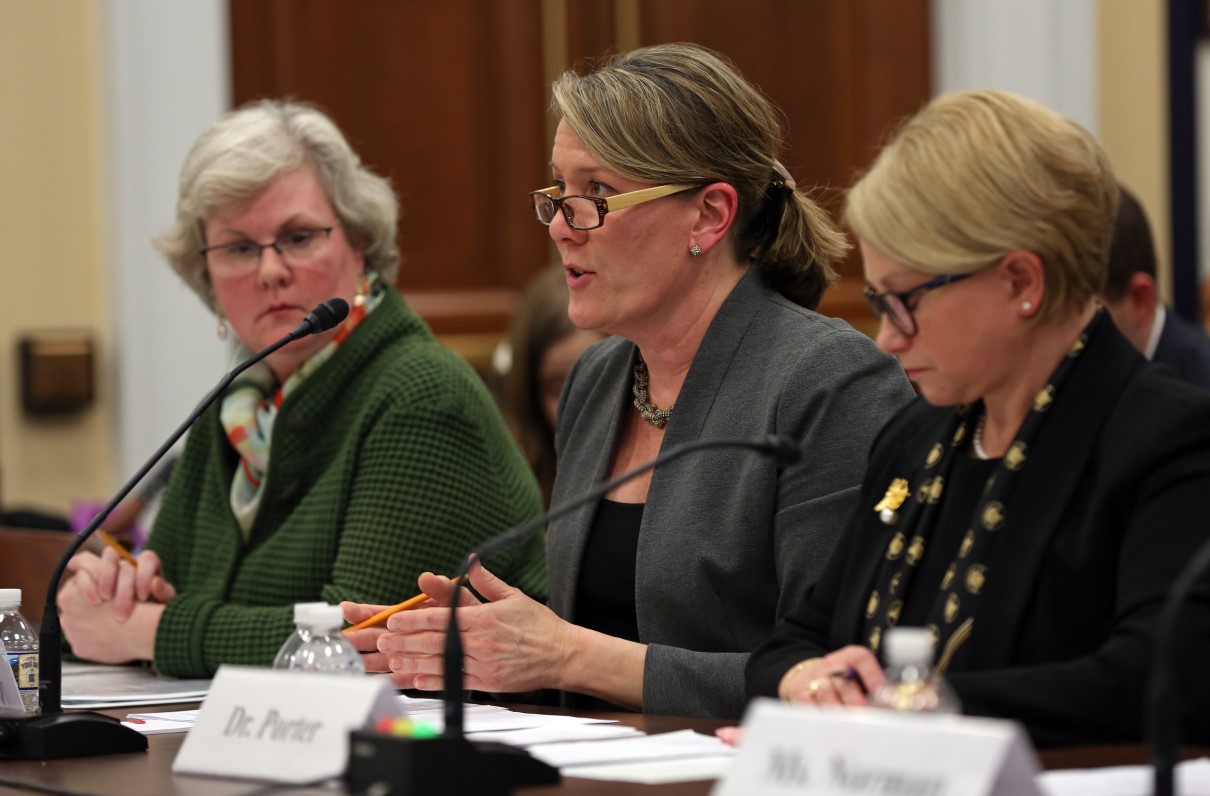(Updated Feb. 6)
Military families with special needs should be notified of actual availability of appointments – not just that special-needs providers exist – before moving to their next duty station, MOAA’s director of government relations for health affairs told lawmakers Wednesday during a House Armed Services (HASC) subcommittee hearing.
Karen Ruedisueli was one of five military family advocates who testified before HASC’s military personnel panel about problems with the Exceptional Family Member Program (EFMP) and the Military Health System (MHS), including gaps in care that can be caused by lengthy waitlists as servicemembers move to new duty stations. She called on members of the subcommittee to address concerns of special needs families.
“EFMP is falling short of serving families as intended,” Ruedisueli said. “These problems must be addressed.”
Ruedisueli recently co-authored a report with the Children’s Hospital of Philadelphia PolicyLab about issues military families with special needs face. Among the report’s findings, military children are 40 percent more likely than civilian children to have at least one special need.
The EFMP provides support and education for military families with special needs, including installation preferences to ensure they will not be sent to locations where they can’t access required resources. The program supported about 137,000 military families, of which about 40% are Army dependents, as of late 2018, according to the most recent statistics from the Defense Department.
'Profound and Gut-Wrenching'
Testimony highlighted the desire for transparency in military assignment processes, proper explanations of denials families receive for request for care, and addressing the perception that enrollment in EFMP stunts career progression.
Subcommittee Chair Rep. Jackie Speier (D-Calif.) said the experiences shared during the hearing are “profound and gut-wrenching.”
“Families shouldn’t have to advocate for themselves when the law is on their side,” Speier said.
Speier asked members of the panel to share their solutions to the problems, and how lawmakers can work collaboratively to help families.
[RELATED: How MOAA Wants to Improve Quality of Life for Military Families]
Some of the witnesses pointed to the Marine Corps’ model, which includes a lawyer to help families navigate the EFMP, as a successful approach and encouraged the other services to follow suit.
Capt. Edward Simmer, USN, chief clinical officer for TRICARE, said the Defense Health Agency is committed to ensuring military children with special needs have access to resources that help them reach their full potential.
“TRICARE provides a robust benefit with low out-of-pocket costs,” he told lawmakers. “Despite our best efforts, however, we know we still have room for improvement. Access to specialty care is challenging in some areas, including remote areas. We can and should do better.”
The impact of caring for a family member with special needs is particularly difficult for military families because of frequent moves to new duty stations. Each time a military family moves, families must restart care with referrals, authorizations and waitlists.
[RELATED: What Is DoD Doing About Child Care?]
Navy spouse Michelle Norman testified before the subcommittee that she has been fighting for the rights of special education for her daughter Marisa over the last six years, a fight that has included legal battles in multiple states.
When Norman’s husband was assigned to Virginia Beach, Va., she enrolled her daughter in a public school and provided her daughter’s Individual Education Plan, which outlines the needs for her daughter to receive education through the school. Norman expressed concern the plan wasn’t being followed – and the school discounted those concerns.
She said the school knew they were a military family and wanted to wait out providing the requirements for Marisa’s education knowing her husband would be moved to a different base in time. Her family has spent more than $200,000 to fight for Marisa’s rights, she said.
MOAA has made several recommendations to improve the care of special needs family members through the EFMP and the Military Health System. Those outlined in MOAA's testimony include:
- Medical screening must not only identify providers at the gaining location, but also more effectively assess actual appointment availability prior to approving a move.
- TRICARE referral policy must allow families to obtain specialty care referrals at the new location prior to their move to minimize disruptions in care.
- Officials need to establish ongoing metrics and quality improvement of the EFMP to ensure the program keeps up with changes in family needs and medical educational services.
MOAA’s written testimony also suggested improvements to TRICARE and the MHS that would help families with special-needs children as well as the wider military community. These include an end to TRICARE copay increases for therapeutic and mental health visits; changes to TRICARE pediatric regulations to broaden the program’s definition of “pediatric medical necessity”; and adding dissatisfaction with access or quality of care at a military treatment facility as a qualifying life event (QLE), preventing military families from becoming trapped in an unavailable or underperforming care system.
The written testimony also addresses wider MHS reform.
“Many challenges EFMP families encounter with the Military Health System (MHS) are not unique to special needs beneficiaries but have a more pronounced impact on them due to their heavy use of the system,” Ruedisueli wrote. “MOAA is hopeful MHS Reform will address these issues, but we are concerned that we have not yet seen many improvements in access, quality of care and the patient experience.”



